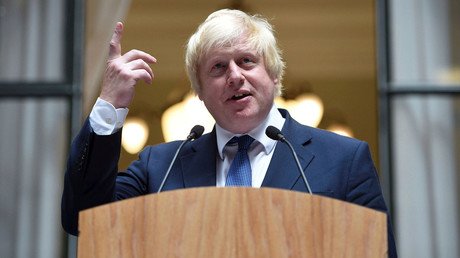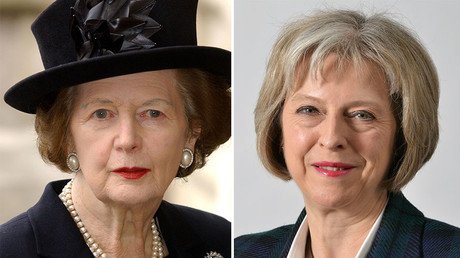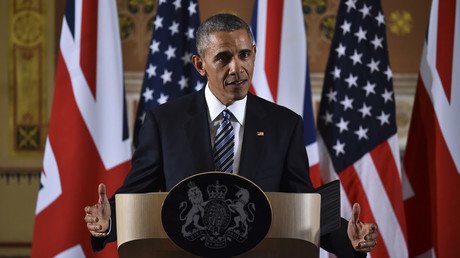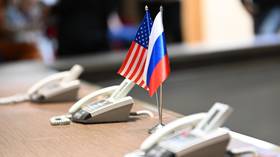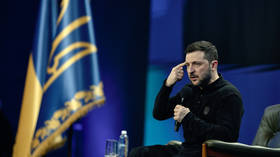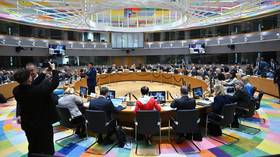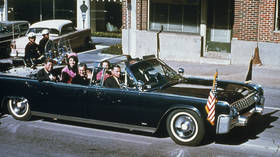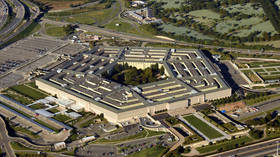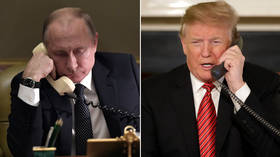Boris Johnson & the strange case of the British foreign secretaries
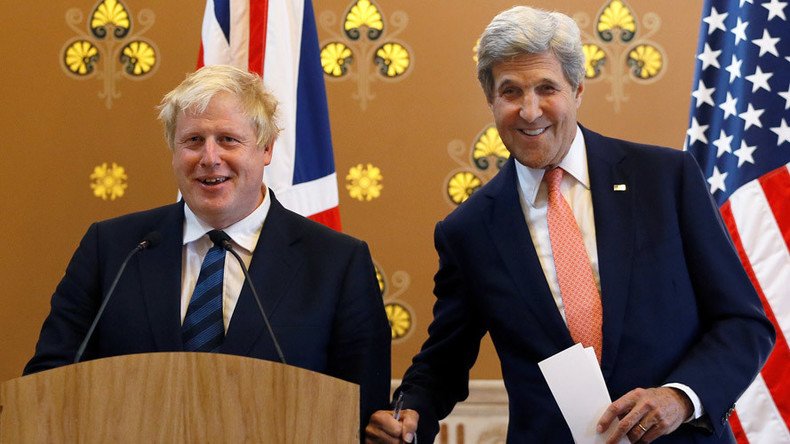
Whatever one thinks of him, British Conservative Party politician and newspaper columnist Boris Johnson hasn't been one to blindly follow what could be called a slavishly pro-US line on foreign policy.
In December, he called for the UK and its allies to work with Russia and the Syrian government against Islamic State (IS, formerly ISIS/ISIL). When Syrian forces, with Russian assistance, liberated the ancient city of Palmyra in March, Johnson praised President Assad. Johnson has also blamed the EU for the crisis in Ukraine – something else you don't expect to hear from prominent British politicians who are always so keen to blame Russia.
But now Boris Johnson seems to have changed his tune.
Consider: Boris Johnson, March 2016, 'Bravo for Assad!' (after Palmyra is liberated from IS).
Boris Johnson, July 2016, 'Assad must go!’
What's going on? How can someone be toasting President Assad one minute and the next minute be saying that it’s his “clear view” that “the suffering of the Syrian people will not end while Assad remains in power”?
Answer: It's called 'Being Appointed UK Foreign Secretary.'
Something very strange seems to happen to people who land this gig. Beforehand they say some quite sensible things on foreign policy, as Johnson did when he called for the West to work with Assad and Russia to defeat IS.
But it seems as soon as they go through the Foreign and Commonwealth Office doors in King Charles Street, SWIA 2AH, the new foreign secretary comes over all Uncle Sam and starts talking the language of the US State Department. “The official enemy Saddam/Milosevic/Gaddafi/Mullah Omar/Assad (delete as appropriate) must go”; “There can be no future for the official enemy”, “we must play an active, more engaged role in foreign affairs”…Repeat ad infinitum.
It's not just BoJo – who, let’s face it, is not a politician renowned for his consistency – who has changed his tune after becoming foreign secretary.
The late Robin Cook was a center-left Labour politician who railed against Ronald Reagan and the arms race in the 1980s. He was a member of the Campaign for Nuclear Disarmament (CND). But when he became foreign secretary, Robin Cook the one-time foreign policy dove morphed into Robin Cook the hawk, with Britain, under his watch, taking part in the December 1998 bombing raids on Iraq and the US Secretary of State’s Madeline aka ‘Mad' Albright’s 78-day bombing of socialist Yugoslavia in 1999. Old admirers of the politician looked on aghast at the transformation.
In 2001 Cook lost his job as foreign secretary and was demoted to be Leader of the House. And guess what? Straight away, he stopped talking the language of the US State Department and became Robin Cook, the man of peace again. He earned a lot of plaudits – and rightly so – for his powerful speech when resigning from the Blair government on the eve of the Iraq war – in which he talked about “the strong sense of injustice throughout the Muslim world at what it sees as one rule for the allies of the US and another rule for the rest.”
“Nor is our credibility helped by the appearance that our partners in Washington are less interested in disarmament than they are in regime change in Iraq,” Cook added.
In July 2005, just a month before his untimely death, Cook wrote in the Guardian of how Osama bin Laden had been “armed by the CIA and funded by the Saudis to wage jihad against the Russian invasion of Afghanistan.”
Robin Cook was a great anti-war politician – except for when he was foreign secretary.
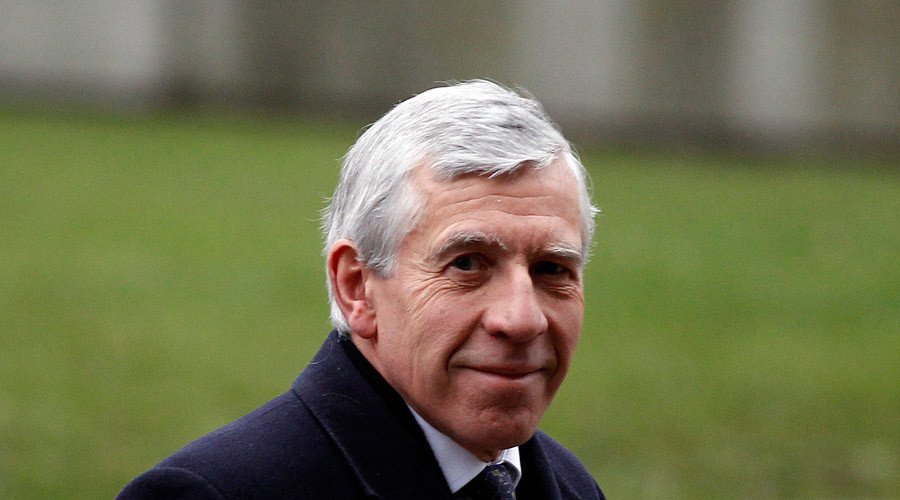
It was a similar story with Cook’s successor, Jack Straw. Straw was a one-time student activist – and like Cook, was also in CND. But as foreign secretary, he helped take Britain into the Iraq war. When he left the Foreign Office, Straw started talking sense again. In 2013 he voted against bombing the Syrian government, which the US and the British government were so keen to do.
“There will be casualties from any military action – some military and almost certainly many civilian,” Straw warned.
Yes, it really was the same Jack Straw who played such a key role in the Iraq war.
Or was it?
One theory (cue some sinister, creepy music), is that politicians who are appointed foreign secretary are kidnapped by the CIA, put in cold storage – and replaced by 'doppelgängers' – i.e. doubles of themselves, programmed to blindly follow the US State Department line. Then, when their time as foreign secretary is over, a switch takes place: the originals are de-frozen and the 'doppelgängers' are destroyed. This could explain why the people in question go back to talking sense – as they did before they were foreign secretary. If that sounds a bit sci-fi-ish then it’s not surprising.
In the classic 1970 Dr Who story The Autons, the Nestene, a non-physical alien intelligence, plan to replace leading politicians and public figures in Britain with plastic replicas, who will help them to take over the country.
While in the New Avengers episode Faces, from 1976, high-ranking British government officials are replaced by down-and-outs who are given plastic surgery by a certain Dr Prator and then brainwashed.
Did the bigwigs at the CIA watch these programs and think, “That‘s a darn good idea. Let‘s try it on UK foreign secretaries!” We do know that Dr Who and The New Avengers were screened in the US….
OK, joke over. My gut feeling, and I expect yours too, is that ‘doppelgängers’ is one conspiracy theory too far.
So why then do our foreign secretaries feel obliged to dance enthusiastically to whatever tune Uncle Sam’s playing on his tin whistle?
For much of the post-WW2 period it could be explained in four words: The Anglo-American Loan. A $3.75 billion loan at 2 percent annual interest. That’s around $57 billion in today’s money.
Pipe-puffing premier Harold Wilson went as far as he could in keeping the UK out of the Vietnam quagmire in the Swinging Sixties, but when anti-war critics asked why he did not come out publicly and denounce US imperialist aggression in south-east Asia, he replied: “Because we can’t kick our creditors in the balls!”
Now here’s the really fascinating bit. As Britain’s debt to the US was reduced, the UK’s adherence to the US in foreign policy became stronger, not weaker. Just compare Tony Blair’s “I’ll be with you, whatever” stance, to that of Wilson’s or Heath’s. The Anglo-American loan was finally paid off in 2006, but four years after the debts were cleared, WikiLeaks revealed how leading members of the Conservative government, when in opposition, had pledged to US diplomats that they would run a ‘pro-US regime’ and buy more US arms when they got into power.
To show his ‘Atlanticist’ credentials, Foreign Secretary William Hague revealed he has a sister who is an American and that he vacationed in the States.
Well, I’ve taken vacations in the States and love visiting the country, but that doesn’t mean I go along with US foreign policy. The US diplomats themselves were amused by just how much Hague and his colleagues were willing to suck up to them.
This child-like eagerness to please the US could also be seen by the comment Boris Johnson made when being asked by a reporter about an apology to Barack Obama he might have to make having been appointed foreign secretary. Johnson, who has offended quite a few people in the past, said that the US “would be in the front of the queue” for apologies. His quip referred of course to the comment Obama had made about Britain having to go to “the back of the queue” for trade deals if it left the EU.
It seems a US president can talk about Britain going to the back of a queue but the British foreign secretary can only talk of the US being at the front.
Doesn’t that tell us everything we need to know about the so-called ‘Special Relationship’?
The conclusion has to be that whoever gets the gig, British foreign secretaries fall into line. Obedience is probably achieved in a variety of ways. It’s silly to think that the ‘deep state’ only occurs in Turkey – there’s enough evidence that we’ve got one in Britain too.
The role of senior civil servants at the Foreign Office, whose job is to ensure continuity, is undoubtedly important. Careerism too plays a big part – as I mentioned here, there are a set of foreign policy positions which those who hold, or aspire to high office in the UK, are expected to hold. Boris Johnson is smart enough to know that if he did displease Washington by exclaiming 'Bravo for Assad!’ at the top of his voice at a White House dinner, word would get through to his boss Theresa May through ‘official channels’ and he’d be sent to the backbenches.
The many ways – covert and overt – in which the US, even after debts have been repaid, exerts pressure on its ‘allies’ to stay subservient is worthy of serious examination. Does the US have files on top British politicians revealing past indiscretions which can be used to turn them into toadies? “Johnson, we have certain information that on March 4, 1981, when you should have been in a Latin class at Eton, conjugating semi-deponent verbs, you were having an illicit cigarette with Carruthers Minor at the back of the bike sheds. Now step into line on Syria!”
The role of the media – particularly the extremely Atlanticist and neocon Murdoch-owned media – in hunting down foreign policy heretics and Imperial Truth Enforcement must also be considered. “There’s someone here who doesn’t support bombing Syria and regime-change in Libya! Exterminate! Exterminate!”
And we must not forget the many US-funded (and often US military-industrial complex funded) think tanks and pressure groups whose job is to make sure there’s no deviation from Atlanticism and an ‘interventionist’ foreign policy, which just happens, totally coincidentally, to be good for arms sales.
Ironically, the biggest threat to the continuance of the special doormat relationship could be an American. Donald Trump – whatever one thinks of his domestic policies (or his hairstyle) – differs from the Beltway consensus on foreign policy in that he doesn’t seem to want to provoke WW3 with Russia and doesn’t seem all that crazy about NATO.
This week we’ve had Boris Johnson taking issue with Trump’s comments on NATO. Now, there’s every possibility that Trump, if elected, will himself fall into line and do what the US military-industrial complex and other foreign policy lobby groups want him to do – i.e. to stir up more conflicts around the world, particularly in the Middle East. But what if he doesn’t? What if The Donald really does – against all the odds – manage to change US foreign policy?
Will we then have the British foreign secretary telling us that we need to leave countries that don’t threaten us alone? And that we should stop trying to provoke WW3 by continually prodding the Russian bear?
If so, it’ll be the neocons who’ll be getting concerned about a British foreign secretary following the US line, and not the rest of us. Who knows, they might even start coming up with wild conspiracy theories about 'doppelgängers'. After all, some are already calling Trump a ‘Manchurian candidate’…
Follow Neil Clark on Twitter @NeilClark66
The statements, views and opinions expressed in this column are solely those of the author and do not necessarily represent those of RT.

